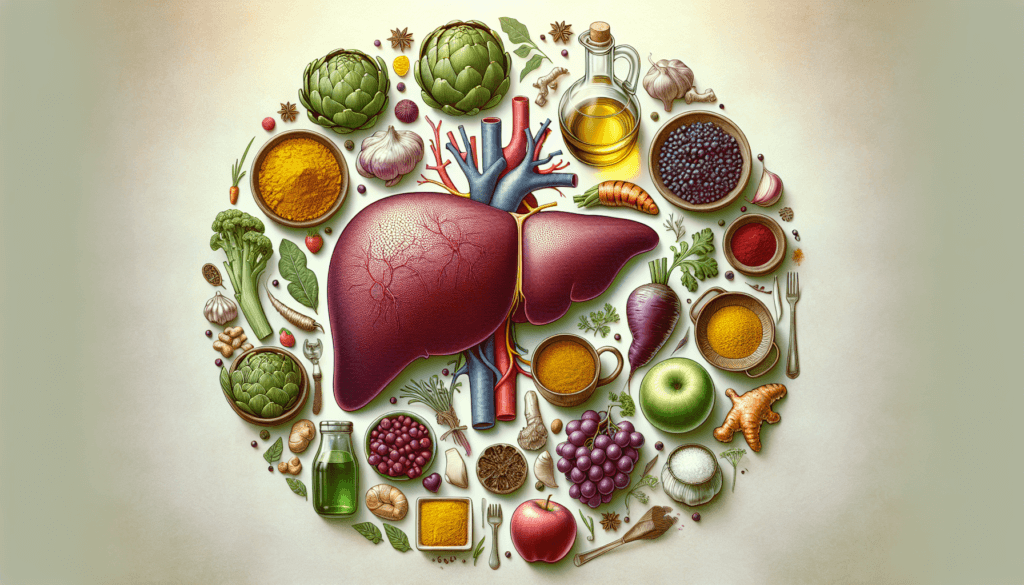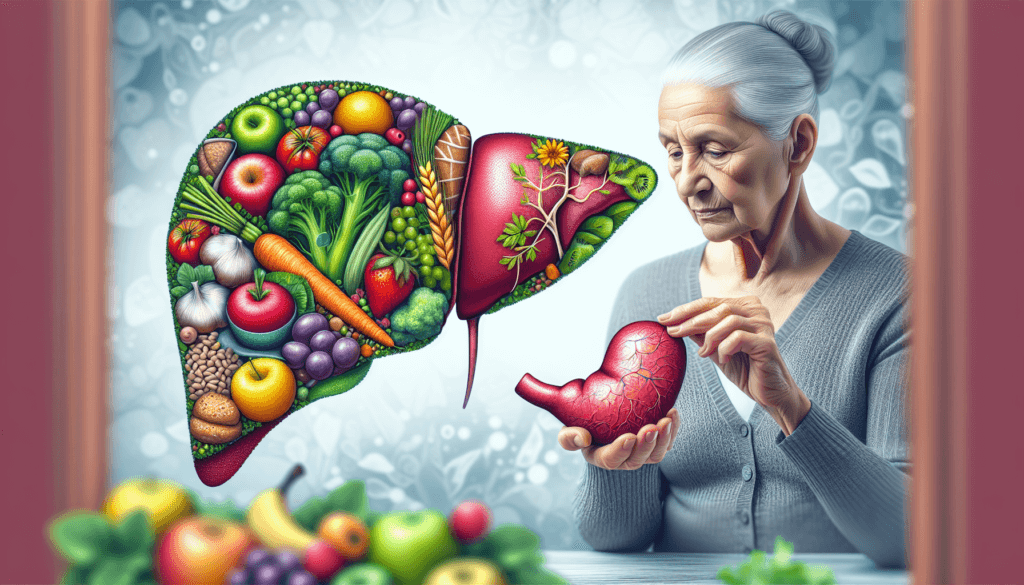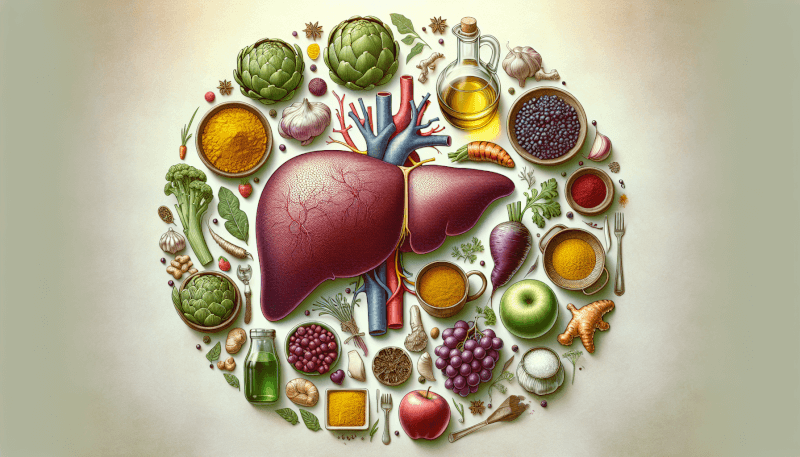Are you a boomer looking to prioritize your liver health? Look no further! This article will provide you with invaluable information on how you can support your liver health through nutrition. As we age, our liver can become more susceptible to damage, making it crucial to adopt a diet that promotes its wellbeing. From incorporating antioxidant-rich foods to reducing alcohol consumption, you’ll discover a wealth of tips to keep your liver in tip-top shape. Say goodbye to any concerns and say hello to a healthier liver with the power of nutrition!

Importance of Liver Health for Boomers
Your liver plays a critical role in maintaining your overall health and well-being. As you age, it becomes even more important to take care of your liver to ensure its proper functioning. The liver is responsible for filtering toxins from your blood, producing bile to aid in digestion, storing essential vitamins and minerals, and metabolizing medications and nutrients. Understanding the role of the liver and how it affects your health is the first step in prioritizing your liver health.
Understanding the role of the liver
The liver is a vital organ that performs numerous functions essential for your body’s well-being. It is responsible for metabolizing and detoxifying harmful substances, such as medications, alcohol, and environmental toxins. Additionally, your liver produces bile, a substance necessary for the digestion and absorption of fats. It also stores important vitamins and minerals, including vitamin A, D, E, K, iron, and copper. Maintaining the health of your liver is essential for overall wellness, as it directly impacts the functioning of other organs.
Common liver conditions in boomers
Boomers, or individuals born between 1946 and 1964, are more prone to certain liver conditions due to various factors. Non-alcoholic fatty liver disease (NAFLD) is one of the most common liver conditions in boomers. It occurs when excess fat accumulates in the liver, leading to inflammation and potential liver damage. Hepatitis C, a viral infection that affects the liver, is also prevalent among boomers who may have been exposed to the virus before the implementation of screening measures. Cirrhosis, a progressive scarring of the liver, is another condition that can occur in boomers. Recognizing the signs and symptoms of these conditions is crucial for early intervention and proper treatment.
Impact of poor liver health on overall well-being
Poor liver health can have far-reaching effects on your overall well-being. When the liver is unable to perform its functions optimally, it can lead to a variety of health issues. Fatigue, digestive problems, and weakened immune function are common symptoms of poor liver health. Additionally, untreated liver conditions can progress to more severe complications, such as liver failure or liver cancer. Taking proactive steps to support your liver health is essential to maintain your energy levels, support digestion, and promote overall vitality.

Key Nutrients for Liver Health
Maintaining a balanced and nutrient-rich diet is crucial for supporting your liver health. Certain vitamins, minerals, antioxidants, and fiber play important roles in liver function and can help protect against liver conditions. Incorporating these key nutrients into your diet can significantly contribute to your liver’s well-being.
Essential vitamins for liver health
Vitamin A, B vitamins (especially B12 and folate), and vitamin C are particularly important for liver health. Vitamin A supports the liver’s natural detoxification processes and helps protect against liver disease. B vitamins, including B12 and folate, are necessary for the production of new liver cells and aid in the metabolism of fats and proteins. Vitamin C is an antioxidant that can help reduce inflammation in the liver and support its detoxification pathways.
Important minerals for liver function
Minerals such as iron, zinc, and selenium are essential for proper liver function. Iron is necessary for the transport of oxygen and the production of red blood cells. Zinc supports the liver’s ability to metabolize toxins and plays a role in collagen synthesis, essential for liver repair. Selenium is an antioxidant that helps protect the liver from oxidative damage.
Antioxidants and their role in liver health
Antioxidants are compounds that help protect your body’s cells, including liver cells, from damage caused by free radicals. Free radicals are unstable molecules that can cause oxidative stress and contribute to liver inflammation and damage. Consuming antioxidant-rich foods, such as berries, leafy greens, and citrus fruits, can help support your liver health.
Fiber and its impact on liver health
Fiber is an important nutrient for liver health due to its role in digestion and toxin elimination. It helps regulate bowel movements and promotes the excretion of waste products, including cholesterol and toxins, from the body. Consuming fiber-rich foods, such as whole grains, legumes, fruits, and vegetables, can help promote healthy digestion and support liver function.
Recommended Foods for Liver Health
In addition to key nutrients, incorporating specific foods into your diet can further support your liver health. These foods provide a range of benefits, from promoting detoxification to reducing inflammation and supporting overall liver function.
Lean proteins
Including lean proteins in your diet, such as poultry, fish, and tofu, can help support liver health. Protein is necessary for the production of enzymes and hormones involved in liver function, repair, and detoxification. Choose lean protein sources to minimize saturated fat intake, which can contribute to liver inflammation.
Fatty fish rich in omega-3s
Fatty fish, such as salmon, mackerel, and sardines, are excellent sources of omega-3 fatty acids, which have anti-inflammatory properties. Omega-3 fatty acids can help reduce inflammation in the liver, protect against fatty liver disease, and support overall liver health. Aim to include fatty fish in your diet at least twice a week.
Colorful fruits and vegetables
Colorful fruits and vegetables, such as berries, leafy greens, cruciferous vegetables, and citrus fruits, are rich in antioxidants and fiber. They help reduce inflammation, support detoxification processes, and provide important vitamins and minerals necessary for liver health. Aim to include a variety of colorful fruits and vegetables in your daily meals.
Whole grains and high-fiber foods
Whole grains, such as brown rice, quinoa, and whole wheat bread, are rich in fiber and provide essential nutrients for liver health. High-fiber foods help regulate digestion, promote toxin elimination, and support a healthy gut microbiome. Include whole grains and other high-fiber foods, such as legumes and nuts, in your diet for optimal liver health.
Healthy fats for liver support
Incorporating healthy fats, such as avocados, olive oil, and nuts, into your diet can provide support for liver health. These fats contain monounsaturated and polyunsaturated fats, which can help reduce inflammation and support the absorption of fat-soluble vitamins. However, moderation is key, as excessive fat intake can lead to weight gain and liver damage.

Avoidance of Harmful Foods and Drinks
Alongside incorporating liver-friendly foods, it is equally important to avoid or limit the consumption of certain foods and drinks that can have detrimental effects on your liver.
Alcohol and its detrimental effects on the liver
Excessive alcohol consumption is one of the leading causes of liver damage. Alcohol is a toxin that, when consumed in large quantities, can overwhelm the liver’s ability to metabolize it, leading to inflammation, fatty liver disease, and ultimately, cirrhosis. Limiting or avoiding alcohol altogether is essential for protecting your liver health.
Refined sugars and processed foods
Refined sugars, such as those found in sweets, sodas, and processed snacks, can contribute to fatty liver disease and inflammation. Processed foods, high in unhealthy fats, artificial additives, and preservatives, should also be avoided. Opt for whole, unprocessed foods whenever possible to reduce the burden on your liver.
Highly processed vegetable oils
Highly processed vegetable oils, such as soybean oil and corn oil, contain high levels of omega-6 fatty acids, which, when consumed in excess, can promote inflammation in the body, including the liver. Instead, choose healthier alternatives like olive oil or avocado oil for cooking and salad dressings.
Excessive salt intake
Consuming excessive amounts of salt can lead to fluid retention and contribute to the development of liver disease. Limit your intake of high-sodium foods, such as processed meats, canned soups, and fast food, and opt for fresh or homemade meals seasoned with herbs and spices instead.
Hydration and Liver Health
Staying hydrated is crucial for maintaining optimal liver function. Water helps flush out toxins and waste products from the body and supports the liver’s natural detoxification processes. Inadequate hydration can hinder liver function and lead to a buildup of toxins. For boomers, it is recommended to drink at least eight cups (64 ounces) of water per day. However, individual water needs may vary, so listen to your body and ensure you’re staying adequately hydrated to support your liver health.

Herbs and Supplements for Liver Support
In addition to a healthy diet, certain herbs and supplements have been found to support liver health and function. While it’s important to consult with a healthcare professional before starting any new supplement regimen, the following herbs have shown promise in promoting liver health:
Milk thistle and its liver-protective properties
Milk thistle is a herb commonly used to support liver health. It contains a flavonoid called silymarin, which has antioxidant and anti-inflammatory effects. Silymarin has been shown to help protect liver cells from damage, promote liver cell regeneration, and support the liver’s detoxification processes. Milk thistle supplements are available in various forms, but it’s important to choose a reputable brand for maximum efficacy.
Turmeric as an anti-inflammatory agent
Turmeric, a vibrant yellow spice, has long been used in traditional medicine for its anti-inflammatory properties. Curcumin, the active compound in turmeric, has been shown to help reduce inflammation in the liver and protect against liver damage. Adding turmeric to your meals, or taking a curcumin supplement, may have beneficial effects on your liver health.
Dandelion root and its detoxifying effects
Dandelion root has been traditionally used as an herbal remedy for liver and digestive health. It is believed to support liver detoxification processes and aid in the elimination of toxins from the body. Dandelion root can be consumed as a herbal tea or taken in supplement form.
Artichoke extract for liver health
Artichoke extract has been shown to have hepatoprotective properties, meaning it helps protect liver cells from damage. It can support liver function by promoting the production and flow of bile, aiding in the digestion of fats. Artichoke extract is available in supplement form, and incorporating artichokes into your diet can also provide similar benefits.
Weight Management and Liver Health
Maintaining a healthy weight is crucial for liver health, especially for boomers. Obesity is closely linked to non-alcoholic fatty liver disease (NAFLD), a condition characterized by excessive fat accumulation in the liver. As you age, it can become more challenging to maintain a healthy weight, but doing so is critical for liver function and overall well-being.
The link between obesity and fatty liver disease
Excess body weight, particularly around the waist, increases the risk of developing fatty liver disease. When the liver is overwhelmed with too much fat, it can lead to inflammation and scarring, impairing its ability to function properly. In turn, this can contribute to various health issues, such as insulin resistance, type 2 diabetes, and cardiovascular disease.
Importance of regular exercise for liver health
Regular exercise is an essential component of maintaining a healthy weight and supporting liver health. Physical activity helps burn excess calories, reduce liver fat, and improve insulin sensitivity. Aim for at least 150 minutes of moderate-intensity aerobic activity, such as brisk walking or cycling, per week, along with strength training exercises to maintain muscle mass.
Balancing caloric intake for weight control
To maintain a healthy weight and support liver health, it’s important to balance your caloric intake with your energy needs. Consuming an excessive number of calories can lead to weight gain and increase the risk of fatty liver disease. Pay attention to portion sizes, prioritize nutrient-dense foods, and be mindful of your overall caloric intake to support a healthy weight and liver function.

Incorporating Liver-Friendly Habits
In addition to proper nutrition and weight management, adopting liver-friendly habits can further support your liver health. Embracing these habits as part of your daily routine can have a positive impact on your liver and overall well-being.
Meal planning and preparation
Planning and preparing your meals at home allows you to have better control over the ingredients and cooking methods. By focusing on liver-friendly foods and avoiding harmful ingredients, you can ensure your meals are nourishing and supportive of your liver health. Incorporate a variety of vegetables, lean proteins, whole grains, and healthy fats into your meals to provide essential nutrients for your liver.
Moderate alcohol consumption
If you choose to consume alcohol, it is crucial to do so in moderation to protect your liver health. The recommended limit is one drink per day for women and up to two drinks per day for men. Binge drinking or excessive alcohol consumption can lead to liver inflammation, fatty liver disease, and other serious liver conditions.
Reducing exposure to environmental toxins
Limiting exposure to environmental toxins can help reduce the burden on your liver. Avoiding tobacco smoke, industrial pollutants, and household chemicals can help protect your liver from unnecessary damage. Whenever possible, choose natural and organic household and personal care products to minimize exposure to harmful chemicals.
Stress management techniques
Chronic stress can have detrimental effects on liver health. Finding healthy ways to manage stress, such as through exercise, meditation, yoga, or engaging in hobbies and activities that bring you joy, can support your liver health. Practicing stress management techniques can help reduce inflammation, improve digestion, and promote overall well-being.
Regular Liver Health Check-ups
Regular liver health check-ups are essential for boomers to monitor their liver function and detect any potential issues early on. Some key aspects of liver health check-ups include:
Importance of routine liver function tests
Routine liver function tests, such as blood tests, can provide valuable insight into your liver health. These tests measure various enzymes, proteins, and substances in your blood that are indicative of liver function. Regularly monitoring your liver function can help detect any abnormalities or signs of liver damage.
Screening for hepatitis and other liver conditions
Screening for hepatitis and other liver conditions is especially important for boomers, as they may have been exposed to hepatitis C before effective screening measures were implemented. Discussing your risk factors with a healthcare professional and undergoing the necessary screenings can help identify any liver conditions early and allow for prompt treatment.
Consulting with healthcare professionals for personalized advice
For personalized advice regarding your liver health, it’s important to consult with healthcare professionals specializing in liver health, such as hepatologists or gastroenterologists. These specialists can provide tailored recommendations based on your individual health status, risk factors, and any pre-existing liver conditions.
Summary and Conclusion
Boomers, as they age, need to prioritize their liver health by understanding the role of the liver, recognizing and managing common liver conditions, and being aware of the impact of poor liver health on overall well-being. Key nutrients, including vitamins, minerals, antioxidants, and fiber, play important roles in supporting liver function. Lean proteins, fatty fish rich in omega-3s, colorful fruits and vegetables, whole grains, and healthy fats are recommended for liver health. Avoiding harmful foods and drinks, staying hydrated, and incorporating herbs and supplements known to support liver health are essential strategies. Additionally, maintaining a healthy weight, regular exercise, adopting liver-friendly habits, and regular liver health check-ups contribute to overall liver well-being. By incorporating these strategies into your lifestyle, you can maintain a healthy liver and support your overall health as a boomer.


